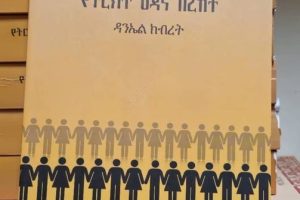
BY MENGESHA AMARE
Of the various issues that need go-betweens, or ‘shimagles’ in local language Amharic, it is better to cite the case of the typical contexts-marriage, bride abduction, beating and injury, and homicide.
These segments of the population do have an irreplaceable role in solving confrontations among the society.
“Our country is endowed with time-tested cultural values that have been transcended from generation to generation apart from the tangible and intangible assets it does have,” said Yimer Adem an elderly when approached by this writer.
Of the traditional dispute resolution means, what the elderly are doing in Ethiopia is an exemplary move in addressing a range of confrontations, rivalry and undesirable quarrels among the community, he added.
The positive attitude of the general society towards the ideas of the elderly is of paramount importance in getting the sources of clashes and skirmish among the people for good.
“The support with which the community has been provided by the elderly is considered as a good initiative and opportunity for the harmonization and application of a range of cultural practices that can nurture the youth with ethical values and productive spirits even can help assist the country’s justice system,” Yimer said.
According to Yimer, the nonexistence of clear laws and policies related to the legitimacy of the informal justice systems, the level of administration to which they should be responsible, their interconnection with the formal courts and other state structures, the scope of application of their jurisdiction and their financial transactions are found to be serious challenges that demand immediate attention.
He further stated that the elderly can reach out to the unreached aspects and help peace and serenity prevail among the society. “For instance, we can cite the case of blood grudge occurs among various tribes in different parts of the country at different times and occasions. It is a very serious human act involving the murder of the former murderer, and his relatives by the victim’s family. Blood grudge is primarily a tradition for many nationals in our country, and its main initial causes are individuals, groups and societal conflict.
As to Yimer, every society has to develop an indigenous institution that could potentially support to manage conflicts of various in nature and only when safeguards are in place can elder mediation be unequivocally recommended.
Another elderly whom this writer approached for comment, Eshetu Kontie, said, “We, as senior citizens of the society, can play an immeasurable in avoiding and healing past wounds and blood feuds between conflicting parties in various rural parts of the nation. It is bearing fruits, indeed.
Unless healing wounds and blood feud conflict is treated and managed properly, it results in social and economic destruction at both family and community level.”
He also stated that the most common types of conflict resolved by the elderly are murdering, property looting, theft, land based conflicts, red-handed aspects. The cost of conflict depends on the type of conflict resolution system that individuals used to settle disagreements.
“The elderly are strong enough to go any remote area without payment believing in the worth of their tiredness from God if they are to be desired by one of the disputing parties when there is blood feud dispute in the surrounding area; they work for reconciliation and peace,” said Eshetu.
He said for cases of intercession and conflict doggedness this means that the words that are chosen, the procedures and ritualized actions and feelings in a way that makes peaceful conflict resolution more probable.
Individual elders are appointed to act as mediators on the basis of their experience, reputation and wisdom. In their role as mediators, the elderly will make the appropriate choices within the cultural limits and actively use the most effective standardized procedure.
As learnt from Eshetu, it is a temple where the Ethiopian ancestral spirits yield power to influence and guide the living in a symphony of hospitality and communal safety; a forum where the living pay tribute to the dead and vow to respect the communal indigenous values that connect the fabric of brotherhood, mutual concern, selflessness, commitment to protect natural and manmade disasters.
Eshetu further underscored that there should be a smooth relationship between the formal and the informal ways of conflict resolution. If there is conflict between the two systems, the whole justice system will become chaotic.
Traditional justice and reconciliation after violent conflict attempts to show how fundamental drawbacks and weaknesses may be avoided when using Ethiopian traditional approaches.
In a nutshell, since Ethiopia does have a well-entrenched traditional reconciliation actors like Aba-Geda, Yehager Shimagle, opinion leaders, well respected elderly and enjoy having customary justice and reconciliation after violent conflict which have highlighted the strengths and weaknesses of both traditional and modern systems of justice. This could potentially advance policy endorsements on a wide variety of areas, particularly on aboriginal justice, consensus and reconciliation practices with which all citizens of Ethiopia in different places have been accustoming since long back.
The Ethiopian Herald 20 March 2021





